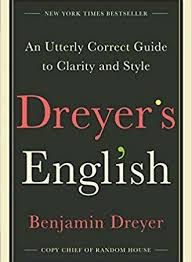Benjamin Dreyer
Random House

|
Go light on the exclamation points. When overused, they’re bossy, hectoring, and, ultimately, wearying. Some writers recommend that you should use no more than a dozen exclamation points per book; others insist that you should use no more than a dozen exclamation points in a lifetime. from Dreyer's English |
English should be fun!!!
Perhaps an odd choice for a book review, but Dreyer’s English is one of the most enjoyable books I’ve read this year. It’s also an excellent resource on grammar and style, and, as we continue to discover at WordFest, this Lower Columbia region has a large number of writers, all who undoubtedly read this column.
Benjamin Dreyer began as a copy editor at Random House in 1993, working with authors such as Michael Chabon, Edmund Morris, and Calvin Trillin. Now executive managing editor and copy chief, he distills nearly three decades of experience into this small and compact book.
His tone is informal, even chatty, so different from the stodgy, prescriptive air of many “grammar books.” He admits he can’t diagram a sentence to save his life and observes, “You’d be amazed at how far you can get in life having no idea what the subjunctive mood is.”
Recognizing that English continues to be a dynamic language, always changing, he’s wary of rules; as soon as you cite one, an exception immediately pops up. He argues instead for the four Cs to guide the writer—Convention, Consensus, Clarity, and Comprehension.
He challenges many established rules, such as NEVER SPLIT AN INFINITIVE, arguing that changing Star Trek’s iconic motto “To boldly go where no man has gone before” to the un-split “Boldly to go where no man has gone before” sounds as if it were translated from the Vulcan. To those grammarians who will fight to the death to NEVER END A SENTENCE WITH A PREPOSITION, he answers with the famous Churchill remark, “This is the kind of arrant pedantry up with which I will not put.” (Though Churchill never actually said it.)
Which is not to say that Dreyer doesn’t have his own admitted peccadilloes and piques. For example, people’s overuse of literally (“No, you did not literally die laughing”) or suddenly as in Suddenly, he ran from the room. (“Makes it all rather less sudden, doesn’t it.”)
Throughout, Dreyer’s humor keeps his book wry instead of dry—“Clichés should be avoided like the plague,” he counsels, and includes a chapter on overused words, close cousins to clichés (“There’s an awfully lot of ‘murmuring’ in fiction nowadays”) and another chapter on commonly misspelled words, including misspell itself—an instance of what he calls “slapstick tragedy.” One chapter is titled “How Not to Write Like a Brit,” arguing against the sometimes stilted sound of writerly writing.
In tone and topic, Dreyer’s English is a worthy companion to Bill Bryson’s Mother Tongue and Made in America: An Informal History of the English Language in the United States. Essential for writers, these works are enjoyable, too, for anyone who loves the English language.
This review first appeared in The Columbia River Reader (June 15-July 15, 2019.) Reprinted with permission.



